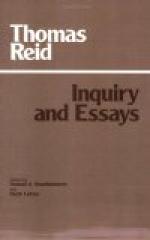|
This section contains 2,424 words (approx. 9 pages at 300 words per page) |

|
Dictionary of Literary Biography on Thomas Reid
Thomas Reid, the originator of Scottish commonsense philosophy, is best known for his critique of the British empiricists, particularly Hume. In contrast to the empiricists, who, as Reid observed, shared the assumption that the objects of human knowledge exist only as ideas in the mind, Reid sought to recover the belief in a world independent of human consciousness: that what we perceive has extramental existence and the laws of nature will operate in the future as they have in the past. Though Reid never set foot in America, scholars of recent decades have recognized his impact on important American thinkers of the eighteenth and nineteenth centuries. Reid's admiration for Baconian natural science, which led him to favor inductive observation and commonsense truths over abstract metaphysics, struck a chord in the American Enlightenment. His Essays on the Intellectual Powers of Man was printed in Philadelphia in 1793; his works, published...
|
This section contains 2,424 words (approx. 9 pages at 300 words per page) |

|


